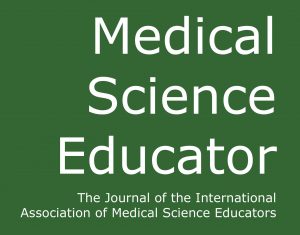
Each month the IAMSE Publications Committee reviews published articles from Medical Science Educator. This month’s review, written by Dr. John L. Szarek, is taken from the article titledDesign and Implementation of the Interprofessional Education Passport Curriculum in a Multi-campus University with Distance Learners, published in the Medical Science Educator, Volume 28, (pages 749–755), 2018 by K. Packard, J. Doll, K. Beran-Shepler, N.H. Stewart, and A. Maio.
For many of us, IPE is a grassroots effort led by faculty champions who take on the responsibility of developing and leading sessions on top of their regular responsibilities. Encouraging the participation of others, and the development and implementation of effective IPE are paramount in developing a sustainable program. In the December 2018 issue of Medical Science Educator, Kathleen Packard and colleagues at the School of Pharmacy and Health Professions, and the School of Medicine at Creighton University describe a curricular model of IPE, The IPE Passport.
The IPE Passport is maintained through an established IPE Center and an IPE Curriculum Committee. A 0.5 credit (8 contact hours) introductory IPE course is the first component of the IPE curriculum. The course is an online, self-paced course that provides a basic introduction to the concepts of IPE and interprofessional collaborative practice for health professions students. After completing the introductory IPE course, students then complete a minimum of three IPE passport activities prior to graduation. Each profession dictates how these activities are achieved. For example, embedding all three activities within the curriculum, using a menu approach or a combination of embedded and menu approaches. IPE Passport activities are developed through an application process which must meet specified rubric criteria and be approved by the IPE Curriculum Committee. All members of the academic community including learners can submit a proposal. The IPE Passport activities are centralized within the IPE Center which facilitates students’ selection of activities, and ensures
Many of us involved in IPE bear the burden of creating activities, logistics, etc. The IPE Passport program is a promising educational curriculum which not only helps programs meet profession-specific IPE accreditation requirements but, importantly, it also encourages other members of the academic community who may not have been involved in the past to take an active role in IPE which helps promote a culture change.
John L. Szarek, BPharm,
Professor and Director of Clinical Pharmacology
Education Director for Simulation
Geisinger Commonwealth School of Medicine
Member, IAMSE Publications Committee